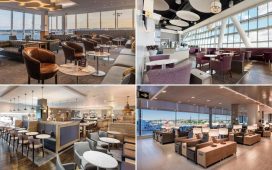IF you feel like you’re spending more time waiting for your flight to take off than actually enjoying your holiday this summer, you might not be far wrong.
Because flights are more likely to be delayed during the summer months according to a pilot – but it’s not just down to bad weather or strikes.
Boeing 787 Dreamliner pilot Charlie Page told The Points Guy: “The summer holidays bring increased demand for flights and with that comes inevitable problems.”
And that’s before you factor in any industrial action or weather issues.
As the day goes on, delays are only going to get worse.
Air traffic control issues, missed gate slots and plane rotations delays can all impact flight times – here’s what you need to know:
Technical issues
If there’s a fault with the aircraft, there will obviously be delays – but airlines have procedures in place to try and reduce the likelihood of this happening.
One of these is the Minimum Equipment List (MEL).
Charlie explained that all planes have a MEL and everything on the list must be present for the plane to take off.
For example, a Boeing Dreamliner has eight wheels with eight brakes, but the plane is allowed to take off if there’s a minimum of six of these working.
But even though the plane is allowed to fly for its next journey, it can have a knock on effect.
The crew will need to report the issue and any broken brakes will have to be fixed the next time it comes in for maintenance.
If there are too many problems, dispatchers can choose to ground the plane.
CODE BREAKER The secret codes airline staff use that could mean your flight will be delayed including PO and DF
Crew working hours
Pilots and flight attendants are only allowed to work a certain number of hours before being made to rest by law.
In Europe, this is 2,000 hours in a 12-month period – or 60 hours in seven days. And there are limits to the number of hours they can work in a day as well.
If the crew end up hitting their limit – even if it’s because of other delays – then they must stop working.
In some cases, this can mean a longer than usual delay as a new crew needs to be found.
This can even lead to cancellations if a new crew cannot be found in time.
Plane rotation
As more people travel over the summer months, there is a higher demand for aircraft.
Airlines have tight turnaround schedules to make sure enough planes are in the right destinations at the right time.
But if there is a delay on one flight, it can have a knock on effect on the rest of that aircraft’s routes – causing delays to scheduled flights that follow.
Missed slots
Planes have designated time slots at airports dictating when they are permitted to take off or land – all organised by Air Traffic Control.
If they miss this, they will need to wait for the next available slot, which can obviously mean delays if it’s a busy day at the airport.
And during summer months and busy flight days, Air Traffic Control are under more pressure than normal to get flights out on time.
This is also why crew prefer to board passengers even if there is a long delay before take off – so they can be ready for any last-minute availability to depart.
If your flight is delayed for more than three hours, you can claim up to €600 (£551) in compensation under EU law 261/2004.
Sun Online Travel previously revealed some of the codes that pilot and cabin crew use to talk to each other.
And we also revealed why pilots say “Roger” to each other.





















